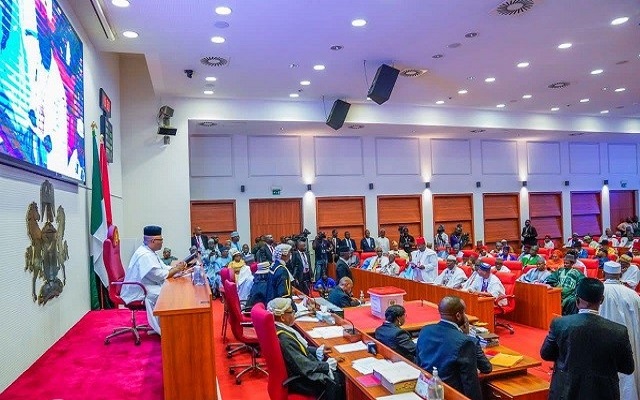News Highlights:
- Senate Launches Major Investigation into ₦1.3 Trillion CBEX Ponzi Collapse
- Lawmakers Demand Accountability from Financial Regulators Amid Rising Suicides and Public Distrust
In an impassioned move to stem the tide of rising financial fraud, the Nigerian Senate on Wednesday declared the proliferation of Ponzi schemes a national emergency, initiating a sweeping investigation into regulatory lapses that enabled the catastrophic collapse of Crypto Bridge Exchange (CBEX)—a digital investment platform accused of defrauding Nigerians of over ₦1.3 trillion.
Described as one of the most devastating financial scams in the country’s history, the CBEX saga is now the tipping point for a long-festering crisis.
Senators warned that unchecked digital investment platforms are eroding public trust in legitimate financial institutions and pushing desperate victims into depression and even suicide.
The motion that triggered the investigation was jointly sponsored by Senators Tokunbo Abiru (Lagos East) and Osita Izunaso (Imo West) and received unanimous approval.
The Senate President, Godswill Akpabio, declared the situation an emergency and threw his weight behind calls for urgent and decisive action, revealing that he too had once fallen victim to a failed Ponzi scheme in Port Harcourt in the 1990s.
“History is repeating itself, only now with even more devastating consequences,” Akpabio said. “₦1.3 trillion gone—just like that. This is an emergency. Families are ruined. Lives have been lost. We must act swiftly and decisively. We cannot sit back while Nigerians are being robbed blind. We must act to prevent more suicides, restore trust, and reclaim our economy from digital predators.”
Presenting the motion, Senator Abiru laid bare how CBEX allegedly exploited the loopholes in Nigeria’s financial regulation framework, evading scrutiny from key oversight agencies including the Central Bank of Nigeria (CBN), Securities and Exchange Commission (SEC), Nigerian Financial Intelligence Unit (NFIU), and the Economic and Financial Crimes Commission (EFCC).
“Over ₦1.3 trillion was lost to CBEX alone. This is not an isolated case. It is part of a disturbing pattern dating back to MMM in 2016 and MBA Forex in 2020. Nigerians are being robbed repeatedly,” Abiru lamented, warning that the aftershocks have triggered “depression, suicides, and a growing mistrust in legitimate financial institutions.”
Lawmakers across party lines echoed this concern. Senator Tahir Monguno (Borno North) described the crisis as “alarming,” stating, “We must strengthen our laws and ensure offenders face the full weight of justice. Enough is enough.”
Senator Sadiq Umar (Kwara North) said institutional failure had exposed millions to financial ruin. “Regulatory bodies must wake up. People trust them to act—not sleep,” he declared.
Senator Solomon Adeola (Ogun West) highlighted a broader threat in the rise of unregulated fintech firms masquerading under the guise of digital innovation. “The CBN must tell us what safeguards exist and how many of these platforms are properly vetted,” he demanded.
Calling for constitutional accountability, Senator Abdul Ningi (Bauchi Central) urged the National Assembly to invoke its powers under Sections 88 and 14 of the 1999 Constitution to compel transparency and reform within the country’s financial oversight system.
In response, the Senate resolved to empower a joint task force of multiple committees—Capital Market; Banking, Insurance and Other Financial Institutions; Anti-Corruption and Financial Crimes; and ICT & Cybersecurity—to investigate not just CBEX but the entire digital investment ecosystem. The lead committee is expected to conduct public hearings and submit its report within four weeks.
The Senate further agreed that the probe would include public sensitization campaigns to promote financial literacy, warning that unless urgent reforms are enacted, Nigeria’s financial space could remain vulnerable to digital predators exploiting desperate citizens.
“This is about the soul of our economy,” Akpabio concluded. “We must clean house now—or watch the entire system collapse under the weight of silence and inaction.”

